
He spent the next few years doing limited-series work for both Image and Archaia, but it was his much praised two-year run on Swamp Thing for DC that paved the way for Soule to become one of the comic industry’s most sought-after writers. In just the last three years, he’s put pen to paper on over 20 series for Marvel, DC, and Oni Press among others.
In his spare time, Soule works as an immigration attorney–the career that predated his meteoric rise in the comic world. It’s a skill he’s utilized to breathe new life into She-Hulk and Daredevil. And now he’s tackling something he, presumably, knows less about; being an interdimensional wizard with his new series Curse Words for Image, with artist Ryan Browne.
Curse Words is a lovely looking book: the colors are sumptuous and the art is frenetic: it seems to constantly challenge the borders of the page to keep hold of it. Similarly, the story grapples in trying to pin down Wizord, the reluctant and selfish protagonist whose fondness for Earth is the only thing that stands between it and oblivion. Wizord was sent to our world to destroy it, at the behest of an all-powerful entity named Sizzajee, for unknown reasons. But just how long will Wizord’s resolve to defend Earth last?
I managed to pin down Soule for a few fleeting moments to chat with him about the writing of Curse Words, how he crafted the dubious morality of his main character, and what other creative projects he might have up his sleeve.
Edie Nugent: Curse Words reads like you’re having a lot of fun writing it. How is the experience of writing it different from say, Daredevil, or Letter 44? I’d imagine they conjure up very different mindsets for you.
Charles Soule: VERY. Curse Words was a conscious effort to write a book that wasn’t quite so bound by “rules,” if that term makes sense. Letter 44 is bounded by the fact that I want to get the Presidential and scientific details mostly right (to the extent possible), and Daredevil and other similar characters I write are part of a decades-old shared universe that needs to survive and thrive past my time with it.
Whereas Curse Words I (and my incredible co-creator Ryan Browne) can literally do anything we want. The book is about magic, and magic opens every possible door.
Nugent: So Curse Words becomes your spell for total artistic freedom?
Soule: Pretty much. The primary motivation for doing this book at all was so that I’d have a chance to work with Ryan. He’s an incredibly gifted visual humorist, which is a really rare skill. He’s also just inventive from a narrative perspective – for years before we started doing anything formal together, we would riff off random story ideas (usually over beers at conventions) and then just go where they took us. It sounds goofy – Ryan Browne and I telling each other stories at 2 AM in convention bars – but that’s the feeling we wanted to capture with Curse Words. It goes anywhere, anything can happen.
Nugent: Wizord has three rules: no love, no cures, no war. Why did you whittle the monkey’s paw aspects of wish fulfillment down to just those three things?
Soule: That’s something that will be explored a bit more as we move on in the story, but the real key to it is that Wizord is kind of a selfish dick. He wants to do each magical gig and be done with it. Cures, wars and love are all the sort of thing that can spin out into endlessly complicated situations, and can put HIM into moral situations he doesn’t want to be in. In short, those three areas are all a sort of a pain in the ass, and he just doesn’t feel like having to deal.
Nugent: So it’s selfishness masquerading as morality?
Soule: That’s Wizord’s whole thing. Selfishness masquerading as morality. We’re starting to skate perilously close to the whole theme of the book! You’ve read more of it than anyone except Ryan, at this point. What do you think Curse Words is actually about? Who am I writing about when I write about Wizord?
Nugent: Spoilers, Charles, please. If I tell you, you won’t have any fun.
Soule: Ha! Okay.
Nugent: It’s a book that features many languages: there’s a fish language, a bird language, and then there’s Langue Mystique, which translates into distinct dialects. Wizord speaks more formally, while Sizzajee and Ruby use american slang. In a book called Curse Words where spells are magic, how is language important?
Soule: Language is everything! I think a lot about how words bring us together and divide us, and how challenging it can be to have real fluency in a language you didn’t learn as a child. I’ve studied a bunch of languages and took a number of linguistics courses in college. My “mains” are French and Mandarin, and I can get by in both, but I was thinking the other day about the word “bitter” and how it works so differently in different contexts – there’s a literal, physical meaning, but also a few emotional meanings. And then, as a writer of English, I was thinking about situations where I might use “bitter” instead of, say, “rueful” – that distinction is SUBTLE.
I don’t know if I’ll ever get to a level of fluency in another language where I’d be able to make a call like that. Language is worlds, worlds and worlds and worlds. And so…
…it’s no accident that it’s a pivotal moment in Wizord’s journey when he does something that should seem obvious – and is obvious to Margaret [Wizord’s mysterious Koala Bear sidekick] – he learns to speak our language. And it’s then that he really becomes unable to destroy us. We’re not alien to him anymore. In a way, when he learns our language, he becomes part of us.
Nugent: Curse Words is very much an Evil vs. Evil story: where the enemy of the worlds’ enemy is actually it’s best friend. What kind of story avenues does having a villain protagonist open up?
Soule: Villains are more fun – to write, to play, and I think to read. So, in Curse Words, I decided to cut out the middleman and make pretty much everyone a bad guy, to some degree or another. Oh, they tell themselves their motivations are pure – but doesn’t every bad guy do that? Even Margaret, the presumed moral center of the book, the “best” character – spent FIVE YEARS researching the best way to help Wizord destroy the world, and is surprised and concerned when he doesn’t actually do it.
I sometimes call Curse Words a “reverse Breaking Bad” – Wizord was an absolute, irredeemable monster, who just decides one day that he’s not anymore. Is that possible? Can that actually work? That’s the book – or at least some of it. Ruby Stitch, Sizzajee and the other characters all have journeys of their own.
Nugent: You’ve got great experience writing characters with secret identities, having penned everyone from Superman and Wolverine to Gwenpool. But it’s never been as high-stakes as it is in Curse Words, where a reveal of Wizord’s villainous origin could literally mean the end of the world. He’s under a lot of pressure.
Soule: He is – and he also knows that he’s not ever safe. He has magical assassins who will be coming to kill him, who could appear at any moment. I think it’s a pretty cool story engine. You have this main character who is fighting only to save his own skin, but by extension is also fighting on behalf of the world, because if he’s killed then the next thing the assassins will do is destroy the planet. He’s accidentally selfless.
Nugent: You delve into very Earthly sources of power–like a culture-defining movie, for instance–as a counter-balance to the more standard, fantasy world power of the mages from Wizord’s [homeworld] Hole World. What magical power sources would you choose to tap if given the chance?
Soule: This is one of my favorite parts of the whole larger story of the book. In his efforts to defeat the various magical assassins coming after him, Wizord has to figure out ways to give himself what I’ll just call “power boosts.” In order to do that, he has to try to access magic here, in our decidedly un-magical world.
So…he has to try to understand what magic is here. My idea is that our version of magic is belief. It’s about these transporting experiences, usually shared between people, where the world seems more connected, more special, more alive than it ordinarily does. So, that can be a shared pop cultural moment, or something more intimate, or something global like religious faith.
The question will be this – what effect will Wizord tapping into these sources of “magic” have on them? It sounds heady, but I think it’s all handled in a pretty fun, accessible way in the story.
Nugent: Sizzajee’s name sounds a lot like Syzygy, when three celestial bodies line up. Curse Words [so far] takes place both on Earth and on Hole World. This leaves room for one more opposing planet or moon, doesn’t it?
Soule: Wow, that’s fascinating. What a neat idea!
Nugent: Can you give us any hints as to who or what might fill that space?
Soule: Nope! Although a close reader of the first arc could probably put it together.
Nugent: You’ve written for two of Star Wars’ loveable rogues: Lando and Poe. You’ve said previously it was easier with Lando, as you’d spent decades familiar with that character. You’ve just wrapped up your second volume of issues with Poe, did fleshing out his story take you anywhere you didn’t expect?
Soule: I’m actually even further ahead than that – you tend to have to write way in advance on Star Wars projects because the Lucasfilm Story Group (who are awesome people) weighs in, and they need to make sure what I’m doing doesn’t conflict or contradict the rest of the larger universe.
Anyway, Poe’s been interesting. I see him as a character like Captain Kirk, who doesn’t really change or evolve from how he initially is, but acts as the catalyst for other people to change. At least in my series – we’ll see what happens in Episodes VIII and IX!
Nugent: You seem to have a knack for writing rogues well, Wizord definitely qualifies. How do you walk the line between just dark enough and too dark?
Soule: Dark / not dark, for me, just translate to selfish/selfless. There are gradations of that, of course – I can imagine a character who acts selflessly to advance another character’s extremely evil interests (Darth Vader is much like that, for example, but it’s hard to think of too many more.) However, unless you’re building a very specific scenario, “good” characters think about what other people want and need, while “evil” characters think about themselves. So, when I’m writing one of these grey, roguish characters, I just push my mental slider towards the selfish side, and off we go.
That’s why Wizord is so interesting to write, and hopefully to read. He’s 100% selfish, but has to play this 100% selfless “character” – we’ll see if he vanishes into the role, so to speak.
Nugent: I’d say evil characters can also think about what others need, but rather than what they want they think of that in terms of what others “should have.” in an ends justifying the means kind of way? Wizord certainly exhibits this to a degree…
Soule: Yes, exactly.
Nugent: Usually it’s the villain who doesn’t know they’re a villain that thinks that way, but Wizord is the reverse.
Soule: I know! I’m tying myself in knots making sure I always understand his moral position, and where HE sees his current moral position. Those are two very different things in this book.
Nugent: Well, you’re nothing if not ambitious! Speaking of ambitious: Are comics your full-time gig now? Between all the books you’re currently working on, and the fact that you also practice law and somehow find time to also helm a kick-ass band …I’m thinking you might actually be a Wizord too?
Soule: It’d be easier if I were. Comics are MOSTLY my full-time gig. I still practice law, but I’ve dialed it back significantly, and I’m pretty selective about which clients I take. Writing is most of my day at this point, which was always the dream.
I also sold my first novel in November, to HarperCollins, which is the other crazy thing that’s happening right now. It’s done, but now it’s about the editing and revision and PR process as we march towards publication – probably around the end of the year. It’s wonderful, but it’s an entirely new workflow I need to understand.
With comics and law and everything else I do, I know the rhythms, so I can pace myself properly. With this novel… I don’t know yet! Will I have a crazy, all-encompassing chunk of work leading up to the release date? Or is the majority of that done? I don’t know – but it’s fantastic that I get to find out.
Nugent: Can you share anything about the novel? What’s the subject?
Soule: It’s called The Oracle Year. It’s about a man who possesses one hundred and eight specific predictions of the future, set to occur over the next few years. It’s about what happens when he goes public as, essentially, a prophet – both to the world and to him.
Nugent: More mysticism then, for fans of this series to try on. So that’s comics, novels, law, and music. Any other frontiers you’re planning to take a crack at?
Soule: I really want to write a musical. I think my skillset would be good for it. We’ll see!
Nugent: Now that would be a thing to see! What subject would you tackle?
Soule: No idea. Space, maybe? I like space.
Curse Words: Issue 1 hits comic stores on February 18. Fans of high-energy, funny fantasy should most definitely pick it up. I’m lucky enough to have read through issue 4 and it’s more than worth your time.


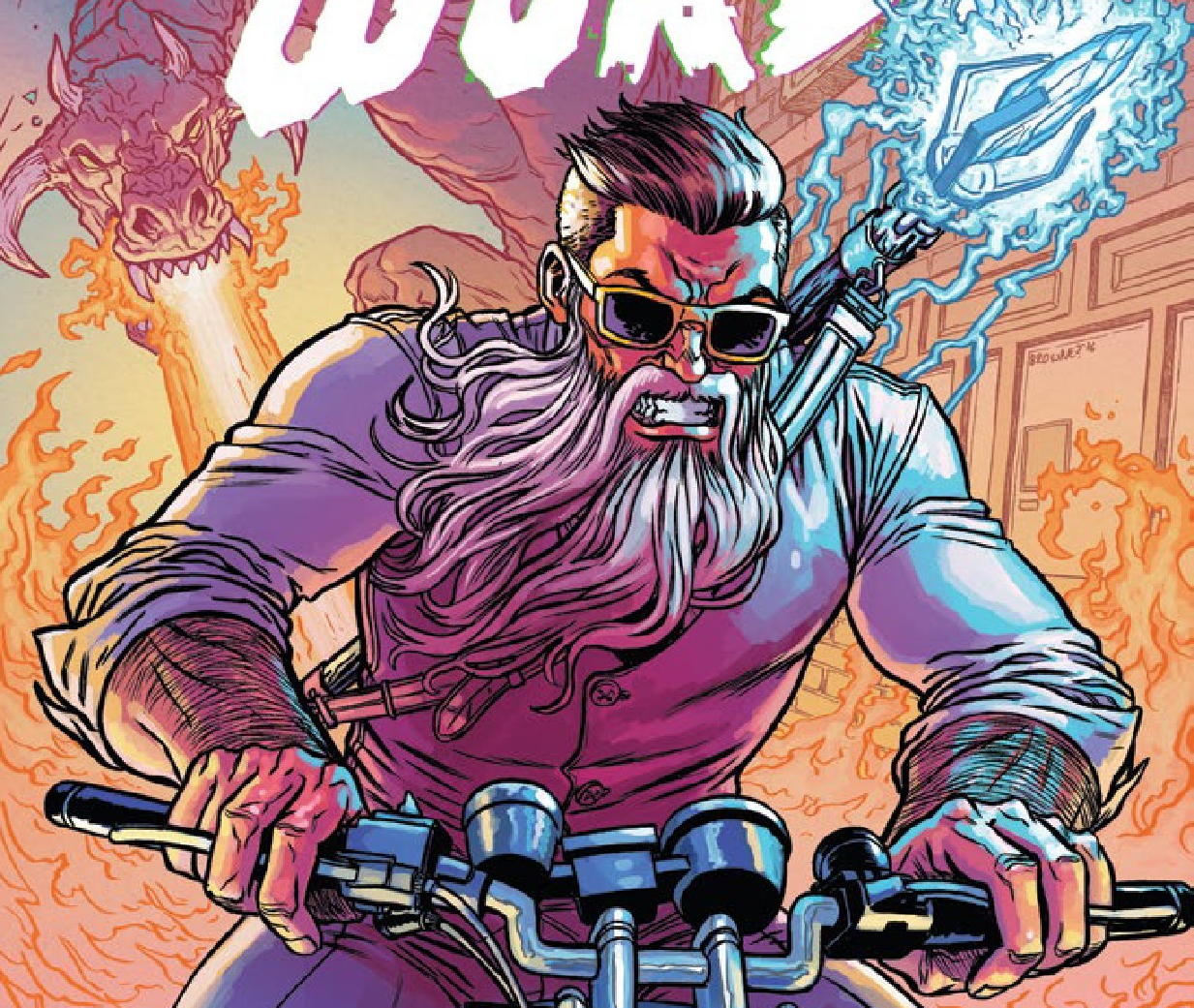
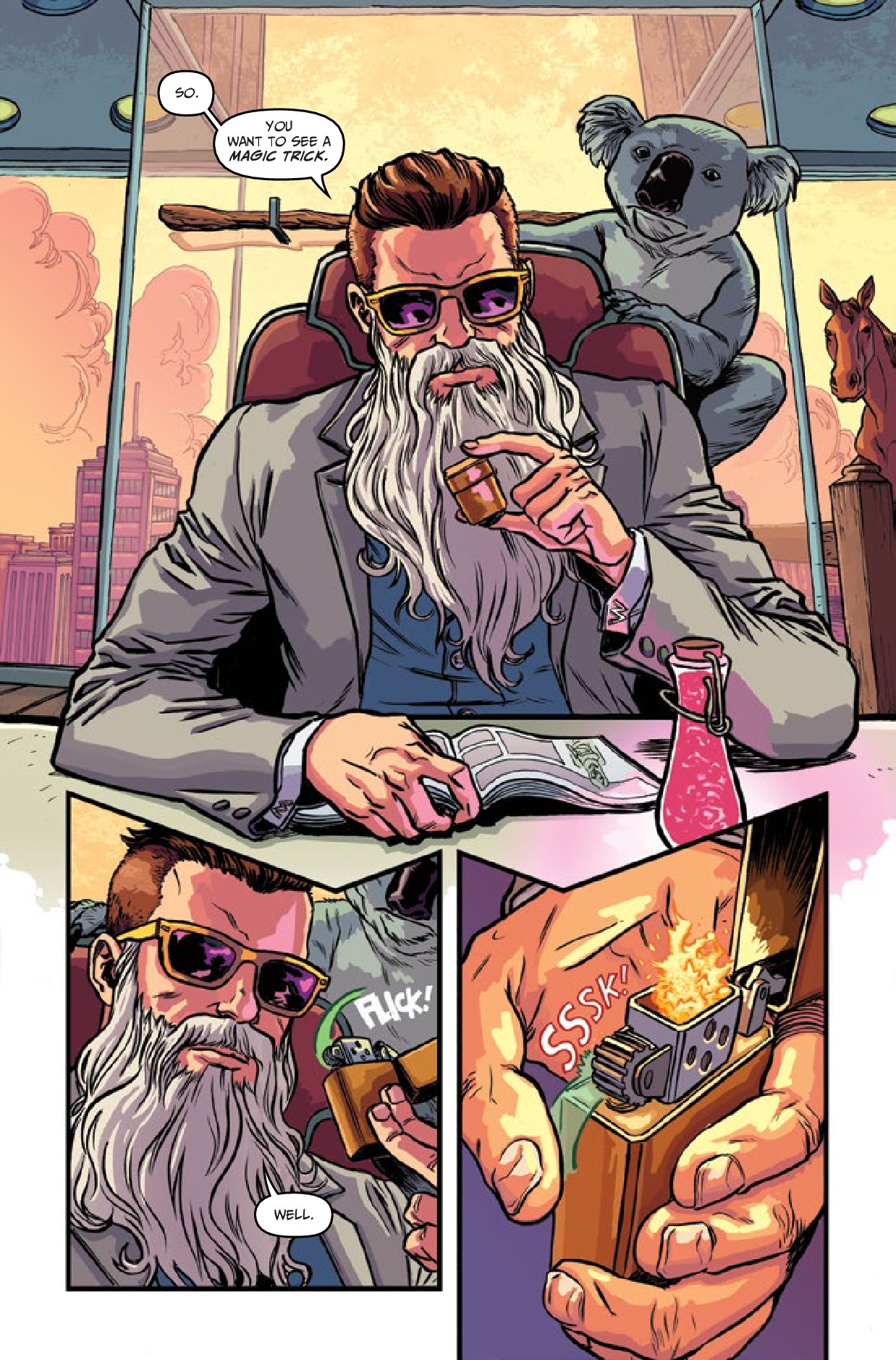
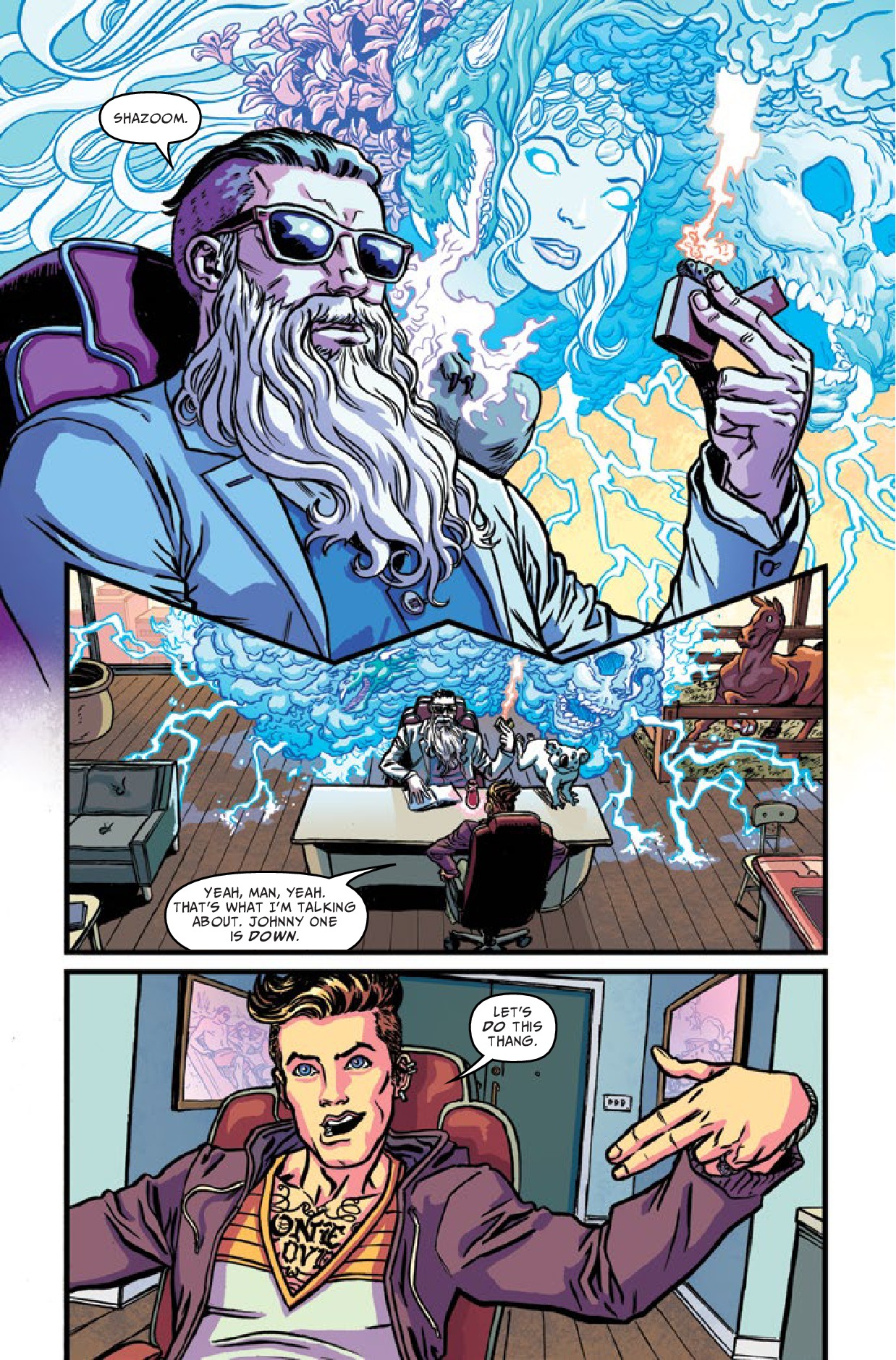
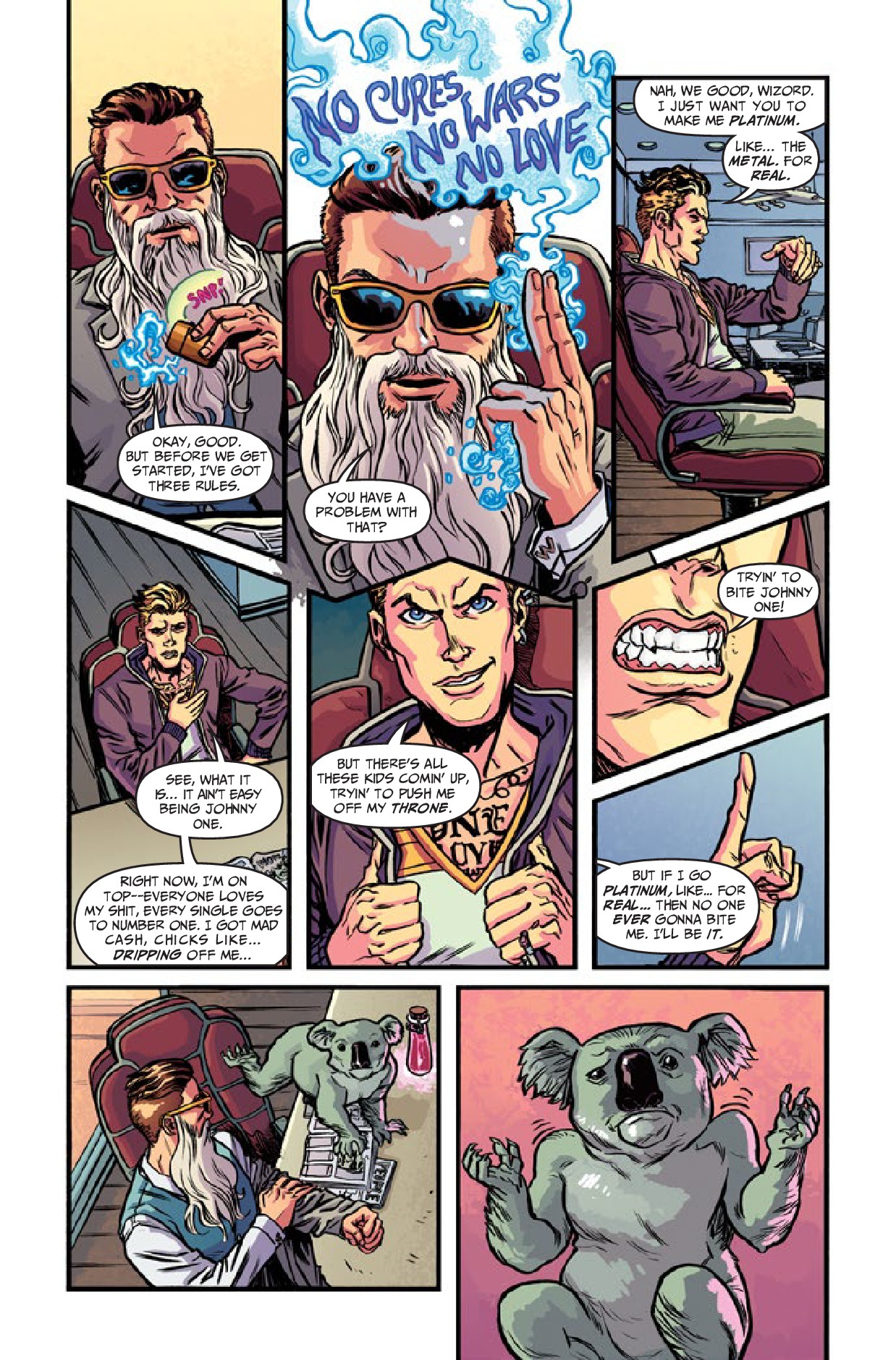
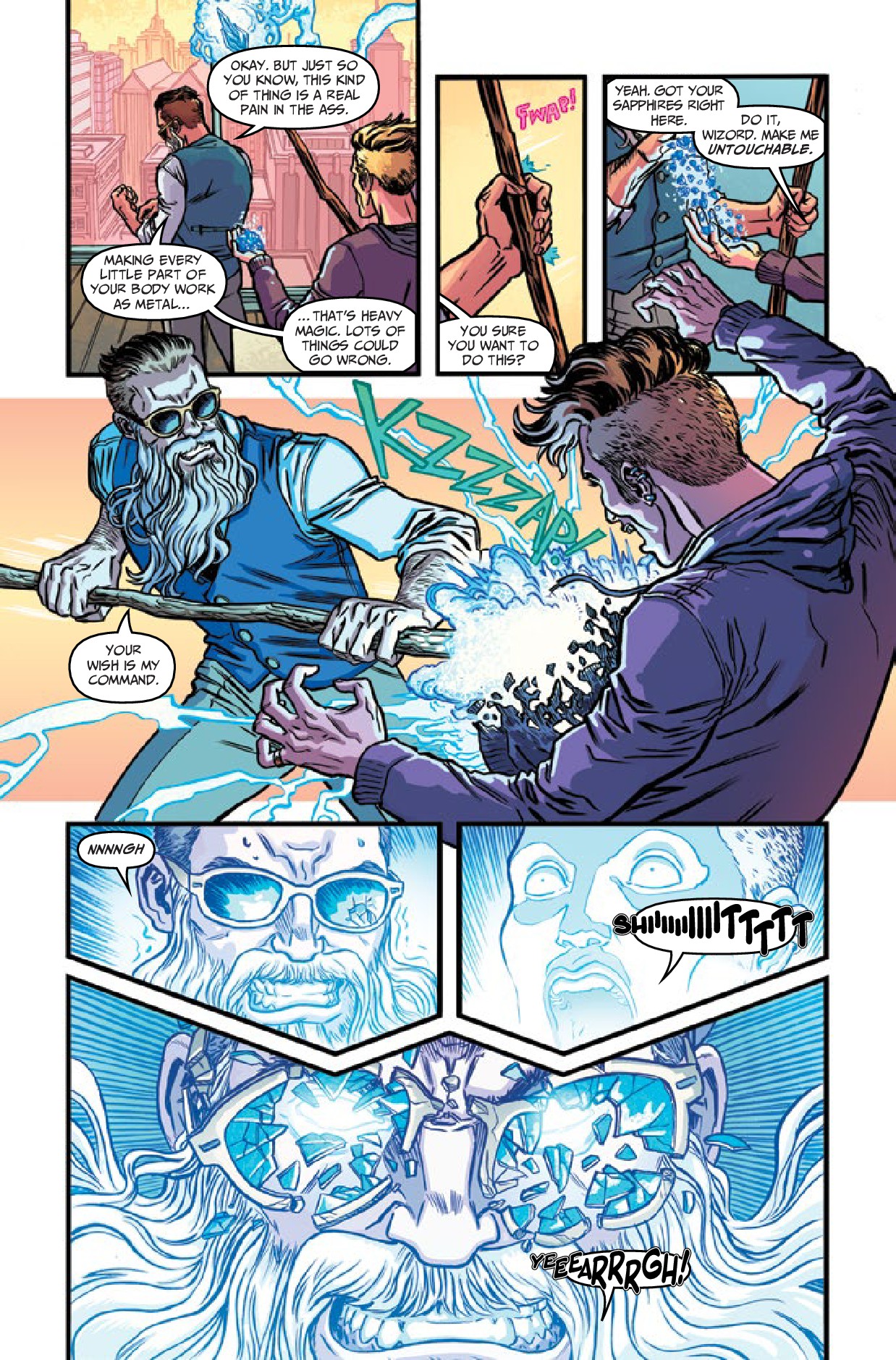
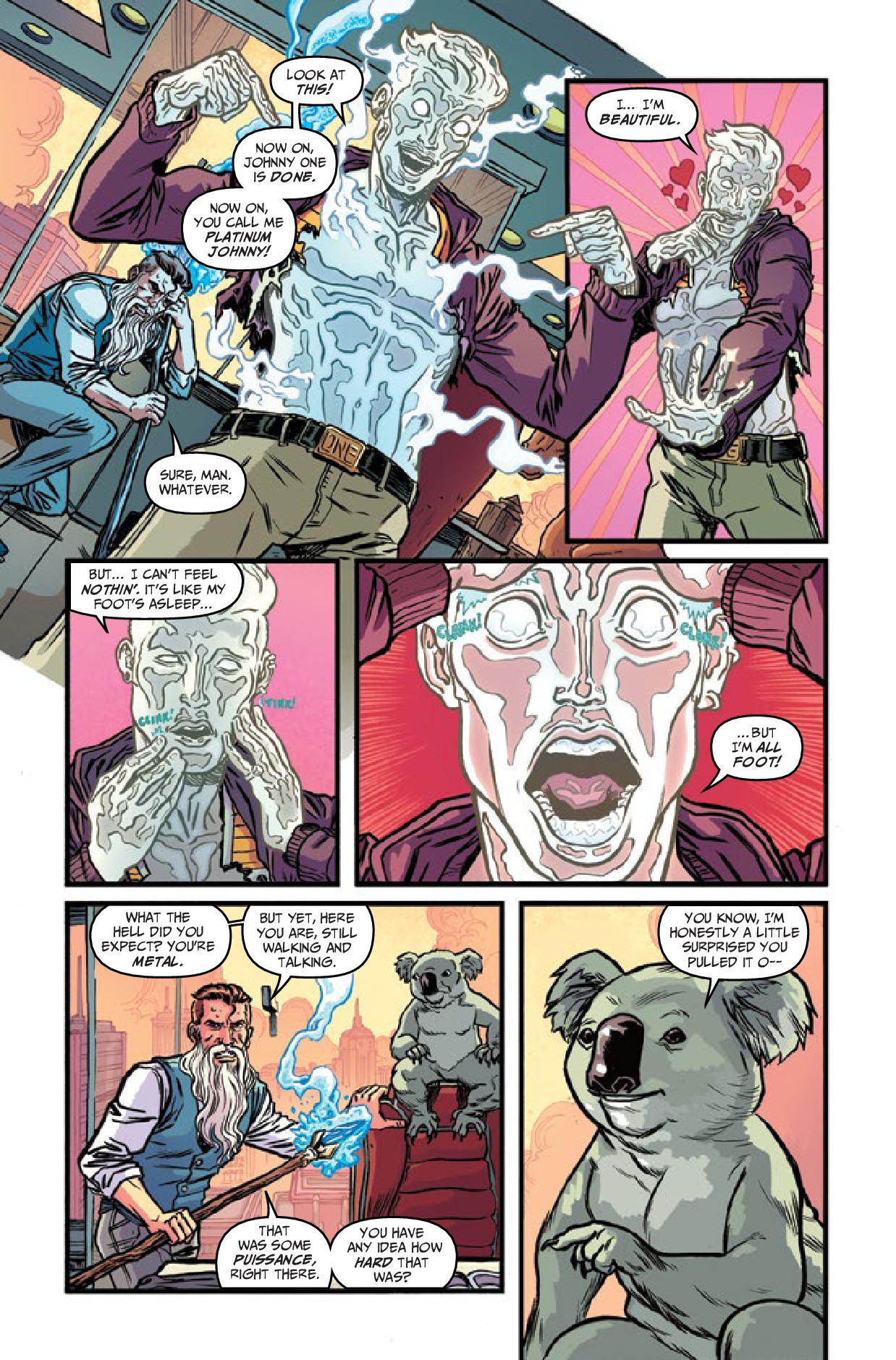
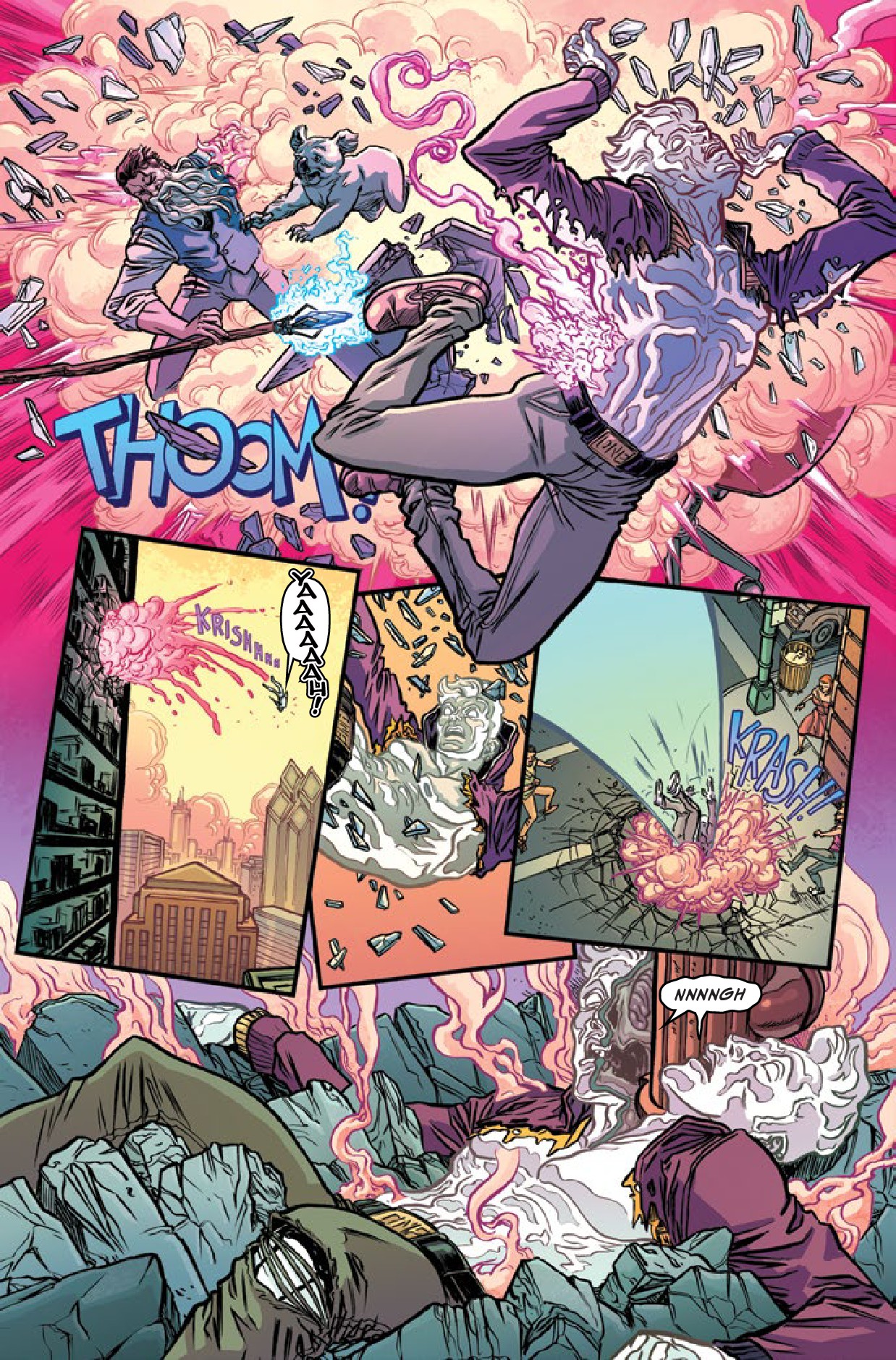
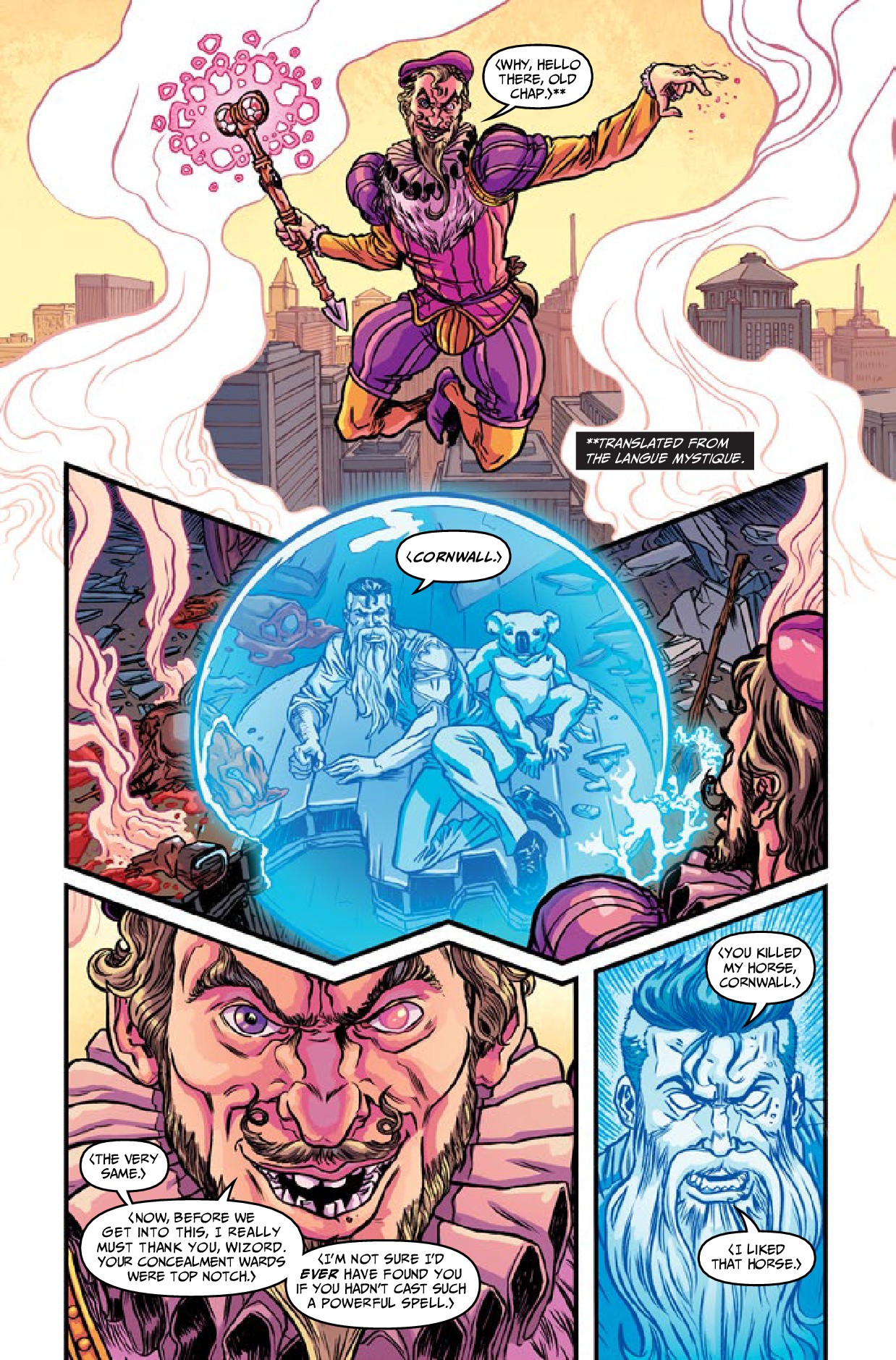
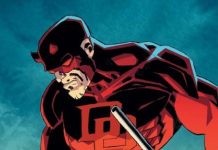
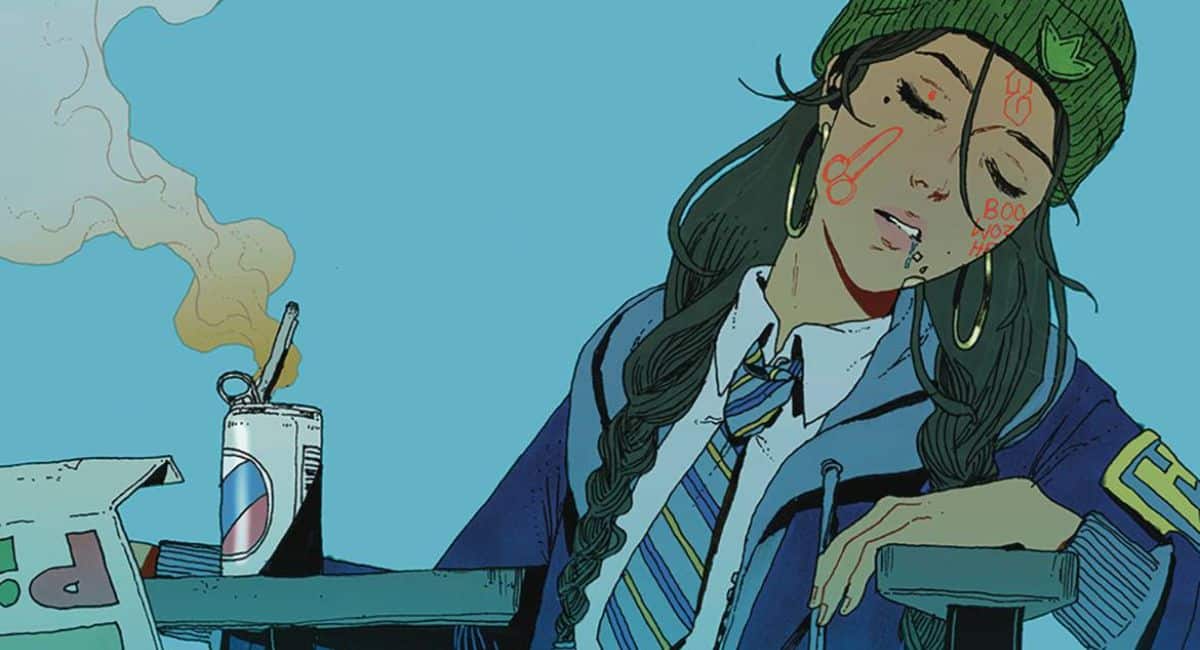




Interesting interview. I’ve enjoyed STRANGE ATTRACTORS and LETTER 44, but I didn’t know what to make of that series. Now I’ll have to ponder the first trade.
– “In a way, when he learns our language, he becomes part of us.”
Sapir & Whorf winked. ^_~
Comments are closed.